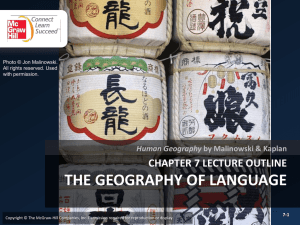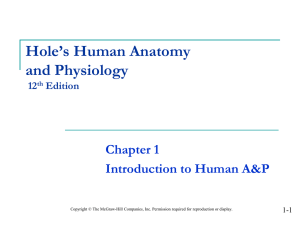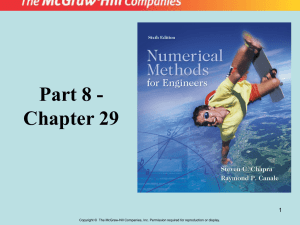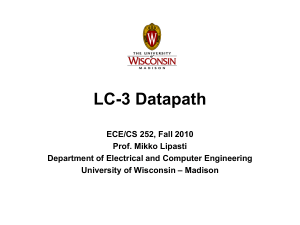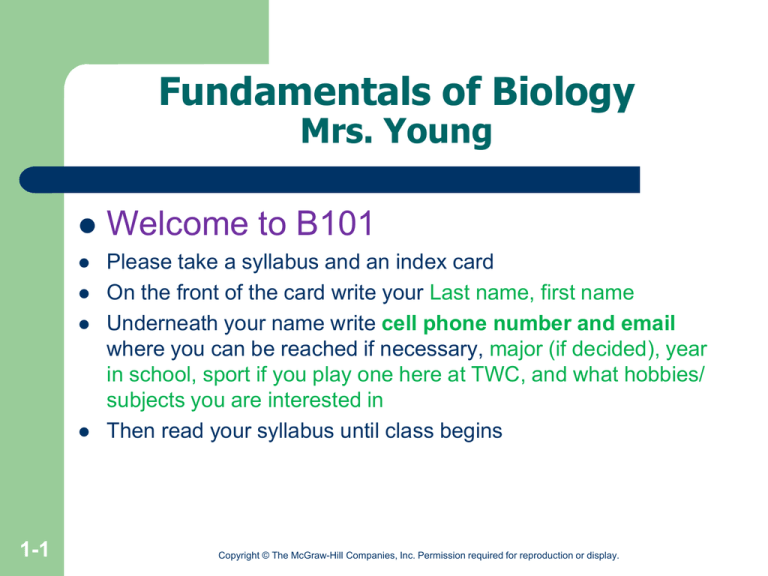
Fundamentals of Biology
Mrs. Young
Welcome to B101
Please take a syllabus and an index card
On the front of the card write your Last name, first name
Underneath your name write cell phone number and email
where you can be reached if necessary, major (if decided), year
in school, sport if you play one here at TWC, and what hobbies/
subjects you are interested in
Then read your syllabus until class begins
1-1
Copyright © The McGraw-Hill Companies, Inc. Permission required for reproduction or display.
Favorite Class
1-2
Take a couple of minutes to describe for me
(on the back of your index card) your favorite
class and why you liked it
Copyright © The McGraw-Hill Companies, Inc. Permission required for reproduction or display.
Mrs. Young
1-3
Office Fisher 105
252-1116
cyoung@twcnet.edu
cyoung.athens@yahoo.com
Webpage www.twcnet.edu/cyoung
Copyright © The McGraw-Hill Companies, Inc. Permission required for reproduction or display.
Background
1-4
M.S. in Physiology and Biophysics
University of Louisville, Louisville, KY
Research at University of Louisville School of
Medicine, Department of Neurology
– Studied treatment of epileptic seizures in an
animal model
– Participated in multicenter drug trial for
antiepileptic medication
Copyright © The McGraw-Hill Companies, Inc. Permission required for reproduction or display.
1-5
Taught at Univ. of Louisville
Taught at Brown Mackie College in Cincinnati
Teaching at TWC: A and P I and II (B155, B156)
Environmental Science (B102)
Fundamentals of Biology (B101)
Fundamentals of Microbiology (B165)
Many other Biology and Chemistry labs
Copyright © The McGraw-Hill Companies, Inc. Permission required for reproduction or display.
Syllabus
1-6
Please read this syllabus completely
Keep it in your notebook for reference throughout the
semester.
Copyright © The McGraw-Hill Companies, Inc. Permission required for reproduction or display.
What it will take to succeed
You will need to
read your textbook, take notes, pay
attention in class, do assignments (which
includes answering questions in the
textbook), study until you understand and
can answer questions on the material, attend
lab, do lab work, and prepare for lab
quizzes….
1-7
Whew! That sounds like an awful lot of work!
Why so much work?
1-8
We learn only 10% of what we read, and 20% of
what we hear
We have to do more to learn more
In biology we are going to be covering some
complex topics: for example we will start with a
quick review of basic and organic chemistry, move
into cell biology, and then go into enzymes,
respiration, and photosynthesis. These topics
cannot be learned well by simply listening to
lectures.
Copyright © The McGraw-Hill Companies, Inc. Permission required for reproduction or display.
Memory Tip
1-9
Memory researcher Robert Bjork “The typical college
student spends far too much time reading and
underlining and far too little time summarizing,
paraphrasing, and testing his or her ability to retrieve
what has been studied”
Inputting and encoding vs retrieval and outputting of
information
Testing has to do with retrieval and outputting of
information so don’t forget this important step when
you are studying
Copyright © The McGraw-Hill Companies, Inc. Permission required for reproduction or display.
Some tips
1-10
Bring textbook to class
Always bring your lab book to lab unless otherwise
specified!
Take notes; rework them after class to clear up
anything that is unclear. Look at a classmates notes
as well as your own. Have a study buddy. Get their
phone number so you will have someone to call if
you have to miss class.
Power points will be posted on my website before
the exam; www.twcnet.edu/cyoung. Take advantage
of this resource
Copyright © The McGraw-Hill Companies, Inc. Permission required for reproduction or display.
Learning Styles
1-11
Visual Learners: draw diagrams and chart
concepts
Auditory Learners: listen to lecture tapes
Kinesthetic or Tactile Learners: learn from
models and specimens, learn by doing
Copyright © The McGraw-Hill Companies, Inc. Permission required for reproduction or display.
Chapter 1
Lecture Outline
See PowerPoint Image Slides
for all figures and tables pre-inserted into
PowerPoint without notes.
1-12
Chapter 1 Assignment
1) List the parts of the scientific method in order and describe
each
2) Discuss how the birdsong experiment we discussed in class
exemplifies the scientific method in terms of the first 4 steps.
3) Define independent variable vs dependent variable
4)
Inductive reasoning vs deductive reasoning
5)
List 5 characteristics of living things
1-13
Copyright © The McGraw-Hill Companies, Inc. Permission required for reproduction or display.
Why a Study of Biology is
Important
To be an informed citizen
An understanding of biology is important to
address a number of social issues today.
–
–
–
–
1-14
DNA testing
Birth control
Global warming
AIDS
Copyright © The McGraw-Hill Companies, Inc. Permission required for reproduction or display.
So then, what is biology?
Biology is the science that deals with life.
What is science?
–
–
1-15
A process used to solve problems and
understand natural events
Involves the scientific method
Copyright © The McGraw-Hill Companies, Inc. Permission required for reproduction or display.
Basic Assumptions in Science
Scientists approach their work with some basic
assumptions:
–
–
–
–
–
–
1-16
Natural events have specific causes.
The causes for events in nature can be identified.
Natural events follow general rules and patterns.
A recurrent natural event has a common cause.
Different people can observe the same natural events.
Natural laws hold true regardless of time and place.
Copyright © The McGraw-Hill Companies, Inc. Permission required for reproduction or display.
Scientists Look for Cause and Effect
Relationships
Events that happen simultaneously are
correlated, but
–
Events have a cause and effect relationship
–
1-17
may or may not have a cause and effect
relationship.
when one event happens as a direct result of a
preceding event.
Copyright © The McGraw-Hill Companies, Inc. Permission required for reproduction or display.
*The Scientific Method
A way of gaining information about the world
that involves
–
–
–
–
1-18
forming possible solutions to questions.
rigorous testing to determine if the solutions are
supported.
continual checking and rechecking to make sure
that previous conclusions are still supported.
modification of unsupported conclusions.
Copyright © The McGraw-Hill Companies, Inc. Permission required for reproduction or display.
Components of the Scientific Method
1-19
Observation
Questioning and exploration
Forming and testing hypotheses
Evaluation of new information
Review by peers
Copyright © The McGraw-Hill Companies, Inc. Permission required for reproduction or display.
Scientific Method
1-20
http://www.youtube.com/watch?v=KZaCy5Z8
7FA
Copyright © The McGraw-Hill Companies, Inc. Permission required for reproduction or display.
*Scientific Method
Identify question
Form testable hypothesis
Consult prior
knowledge
Collect data to test hypothesis
If hypothesis is
rejected
Interpret results
Report for peer review
Publish findings
1-21
Copyright © The McGraw-Hill Companies, Inc. Permission required for reproduction or display.
Observation, Questioning and
Exploration
An observation is a thoughtful and
careful recognition of an event or a fact.
The careful observation of a
phenomenon leads to a question.
–
–
1-22
How does this happen?
What causes it to occur?
The question must be testable.
Scientists then explore scientific
publications to find any information that
has been gathered about the question.
Copyright © The McGraw-Hill Companies, Inc. Permission required for reproduction or display.
Constructing Hypotheses
Once the question is asked, scientists
propose answers.
These answers are hypotheses.
Hypotheses must:
–
–
–
–
1-23
be logical
account for all current information
be testable
make the least possible assumptions
Copyright © The McGraw-Hill Companies, Inc. Permission required for reproduction or display.
Testing Hypotheses
Hypotheses need to be tested to see if they
are supported or disproved.
–
–
There are several ways to test a hypothesis:
–
–
–
1-24
Disproved hypotheses are rejected or modified.
Hypotheses can be supported but not proven.
Gathering relevant historical information
Make additional observations from the natural
world.
Experimentation
Copyright © The McGraw-Hill Companies, Inc. Permission required for reproduction or display.
Experimentation
An experiment is a re-creation of an
occurrence.
–
It tests whether or not the hypothesis can be
supported or rejected.
Experiments must be controlled.
–
–
This means that all aspects except for one
variable must be kept constant.
They usually include two groups.
1-25
Experimental group: variable is altered
Control group: variable is not altered
Copyright © The McGraw-Hill Companies, Inc. Permission required for reproduction or display.
Experimental Design
The variable that is altered is called the independent
variable. (What we are changing)
–
The variables that change in response to the
independent variable are called dependent variables.
–
1-26
Experiments should have only one independent variable.
Changes in the dependent variables are documented as
data. (What we are measuring)
Data from the experiment is analyzed and
hypotheses are rejected and revised or supported.
Copyright © The McGraw-Hill Companies, Inc. Permission required for reproduction or display.
*A Sample Experiment
Hypothesis: Male sex hormones produced by the testes
stimulate male birds to sing.
Experimental group: Male birds with testes removed at birth.
Control group:
Independent variable:
Dependent variable:
Data:
Conclusion:
1-27
Copyright © The McGraw-Hill Companies, Inc. Permission required for reproduction or display.
*A Sample Experiment
1-28
Hypothesis: Male sex hormones produced by the testes
stimulate male birds to sing.
Experimental group: Male birds with testes removed at birth.
Control group: Male birds subjected to a similar surgery that
were allowed to develop normally with testes. Why do surgery
on these birds?
Independent variable: presence or absence of testes.
Dependent variable: presence of singing behavior.
Data: Male songbirds without testes do not exhibit singing
behavior.
Conclusion: Hypothesis is supported.
Copyright © The McGraw-Hill Companies, Inc. Permission required for reproduction or display.
Experimental Data
Experiments must:
–
–
The validity of experimental results must:
–
–
1-29
use large numbers of subjects or must be
repeated several times (replication).
be independently reproducible.
be tested statistically.
be scrutinized by other scientists.
If the hypothesis is supported by ample
experimental data, it leads to a theory.
Copyright © The McGraw-Hill Companies, Inc. Permission required for reproduction or display.
*Theory
A theory may be defined as a widely accepted,
plausible general statement about a
fundamental concept in science.
–
The germ theory states that infectious diseases are
caused by microorganisms.
–
Theories continue to be tested.
1-30
Many diseases are not caused by microorganisms, so we
must be careful not to generalize theories too broadly.
Exceptions identified
Modifications made
Copyright © The McGraw-Hill Companies, Inc. Permission required for reproduction or display.
A Scientific Law
A scientific law is a uniform and constant fact of
nature that describes what happens in nature.
–
–
Scientific laws promote the process of generalization.
–
–
Inductive reasoning
Since every bird that has been studied lays eggs, we can generalize
that all birds lay eggs. (IGA)
Once a theory becomes established, it can be used to
predict specific facts.
–
1-31
An example:
All living things come from pre-existing living things.
–
Deductive reasoning
We can predict
that a newly discovered bird species will lay eggs.
Copyright © The McGraw-Hill Companies, Inc. Permission required for reproduction or display.
Scientific Communication
Data is shared with the
scientific community through
research articles published
in scientific journals.
–
1-32
These articles are
scrutinized by other
scientists before they are
published.
Scientists present
preliminary data at
conferences.
Scientists collaborate
Copyright © The McGraw-Hill Companies, Inc. Permission required for reproduction or display.
Fundamental Attitudes in Science
Scientists must distinguish between opinions and
scientific facts.
–
A good scientist must
–
–
–
1-33
Scientists’ opinions may become facts if supported by data.
be skeptical.
not be biased.
be honest in analyzing and reporting data.
The critical difference between science and nonscience is that in science, one can test the
principle. In non-science, one may not be able to.
Copyright © The McGraw-Hill Companies, Inc. Permission required for reproduction or display.
Theoretical vs. Applied Science
Initially, some scientific data
seems to be purely
informational and not very
practical.
Practical applications
usually follow the
discoveries of basic science.
–
–
1-34
The discovery of the structure
of DNA has led to new drug
treatments for many diseases.
The discovery of
microorganisms has led to a
dramatic decrease in infectious
disease and food preservation.
Copyright © The McGraw-Hill Companies, Inc. Permission required for reproduction or display.
Science vs. Nonscience
Scientists continually challenge and test
principles to determine cause-and-effect
relationships.
–
Nonscientists cannot test their hypotheses
directly and often cannot establish causeand-effect relationships.
–
1-35
Biology, Physics, Chemistry, Astronomy
History, Literature, Philosophy, Art, Sociology,
etc.
Copyright © The McGraw-Hill Companies, Inc. Permission required for reproduction or display.
Pseudoscience
A deceptive practice
that uses the language
of science to convince
people into thinking that
a claim has scientific
validity.
–
–
1-36
Marketing claims of
nutritional supplements.
Marketing claims of
organic foods.
Copyright © The McGraw-Hill Companies, Inc. Permission required for reproduction or display.
Limitations of Science
The scientific method can only
be applied to questions that have
a factual base.
Questions of morality, values,
social issues and attitudes
cannot be tested scientifically.
Science is limited by scientists.
–
–
But, science is self-correcting.
–
–
1-37
People are fallible.
The sun orbits the earth.
New data shapes new
hypotheses.
The earth rotates on its axis, so
maybe the earth orbits the sun.
Copyright © The McGraw-Hill Companies, Inc. Permission required for reproduction or display.
The Science of Biology
Biology is the study of living things.
Theoretical biology
–
Applied biology
–
1-38
Evolutionary biology, animal behavior,
biochemistry
Medicine, crop science, plant breeding, wildlife
management
Copyright © The McGraw-Hill Companies, Inc. Permission required for reproduction or display.
What makes something alive?
1-39
Copyright © The McGraw-Hill Companies, Inc. Permission required for reproduction or display.
*What makes something alive?
1-40
Living things can manipulate energy and
matter.
Copyright © The McGraw-Hill Companies, Inc. Permission required for reproduction or display.
*Characteristics of Living Things
Metabolic processes
–
Generative processes
–
–
1-41
Organisms gain and store energy in the
chemical bonds in the nutrients they take in.
Organisms grow by increasing the number
of cells.
Organisms reproduce either sexually or
asexually.
Copyright © The McGraw-Hill Companies, Inc. Permission required for reproduction or display.
Characteristics of Living Things
Responsive processes
–
Organisms react to changes in their
environment.
Irritability:
the ability to recognize that
something in its surroundings has changed (a
stimulus) and respond to it quickly.
Individual adaptation: a longer term response
to an environmental change.
Evolution: changes in a population over time.
1-42
Copyright © The McGraw-Hill Companies, Inc. Permission required for reproduction or display.
Characteristics of Living Things
Control processes
–
Enable organisms to carry out metabolic
processes in the right order.
Coordination:
Enzymes coordinate metabolic
reactions.
Regulation: Enzymes are regulated in order to
maintain homeostasis.
Unique structural organization
–
1-43
Organisms are made of cells.
Copyright © The McGraw-Hill Companies, Inc. Permission required for reproduction or display.
*Levels of Biological Organization
1-44
Biosphere—the worldwide ecosystem.
Ecosystem—communities that interact with
one another in a particular place.
Communities—populations of different
organisms interacting with each other in a
particular place.
Population—a group of individual organisms in
a particular place.
Organism—an independent living unit.
Copyright © The McGraw-Hill Companies, Inc. Permission required for reproduction or display.
Levels of Biological Organization
1-45
Organ system—many organs that perform a particular
function.
Organ—many tissues that perform a particular function.
Tissue—many cells that perform a particular function.
Cell—simplest unit that shows characteristics of life.
Molecules—specific arrangements of atoms.
Atoms—the fundamental units of matter.
Copyright © The McGraw-Hill Companies, Inc. Permission required for reproduction or display.
The Significance of Biology in our
Lives
Biology has significantly contributed to our
high standard of living.
For example:
–
–
–
–
–
–
1-46
Advanced food production
Significant progress in health
Advances in disease control
Advances in plant and animal breeding
Advances in biotechnology
Progress in genome studies
Copyright © The McGraw-Hill Companies, Inc. Permission required for reproduction or display.




